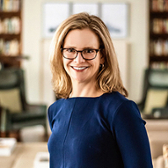Elizabeth Lenaghan
Director and Professor of Instruction; Director, The Writing Place

- e-lenaghan@northwestern.edu
- 847-467-4462
- 555 Clark St., 245
As director of the Cook Family Writing Program, Elizabeth Lenaghan works with colleagues across the university to help design writing objectives, curricula, and assessments that align with the program’s overarching objective: to help writers communicate clearly and persuasively. As part of this work, Lenaghan belongs to the Provost’s Advisory Committee on Generative AI. Additionally, Lenaghan and her Writing Program colleagues are working to develop a method for assessing the new WCAS writing requirement. In such work, Lenaghan seeks to foreground the agency of students and create classrooms where writers are supported to take risks and learn through feedback and revision.
The same goals motivate Lenaghan’s teaching in expository writing, intermediate composition, and practical rhetoric. Her current college seminar, The Terror and Triumph of Youth, explores historic and contemporary risk taking to critically assess the unique opportunities that college students have to innovate across a variety of domains. Another expository writing class examines how new modes and genres of written communication impact the style, content, and frequency of formal and informal writing practices. Lenaghan also teaches English 570, a seminar for graduate students who wish to learn more about the teaching of writing.
Lenaghan’s work with graduate writers extends to her role as the assistant director of Northwestern University’s Writing Place. As the founding director of the Graduate Writing Place, she selects and oversees a group of advanced PhD candidates who serve as graduate writing fellows. The writing fellows and she hold one-on-one writing consultations with graduate students, postdocs, and faculty members, providing feedback and assistance about writing in a variety of genres, including course work, dissertation proposals and chapters, fellowship applications, job market materials, and manuscripts for publication. She also facilitates writing workshops, interdisciplinary writing groups, and dissertation boot camps aimed at teaching participants concrete strategies and exercises to improve both the quality and productivity of their writing, both within the workshops and outside of them. Lenaghan earned a Graduate School Service Award for this work in 2014. She has published two pieces on graduate student writing: the article “Writing Centers and Graduate Student Leadership,” in the December 2013 issue of Academic Exchange Quarterly, and the chapter “Revisiting the Remedial Framework: How Graduate Writing Centers Can Better Serve Graduate Students and Themselves,” in the 2020 edited collection Re/Writing the Center.
Like her teaching, Lenaghan’s university and professional service focus on empowering writers and students to succeed on their own terms. In partnership with the Provost’s Office, she has facilitated several faculty writing retreats. She is the academic co-director of the Summer Academic Workshop. And, in her role as faculty-in-residence in the Elder Residential Community, she engages students in regular social events that emphasize the importance of taking breaks from their often over-scheduled lives.
